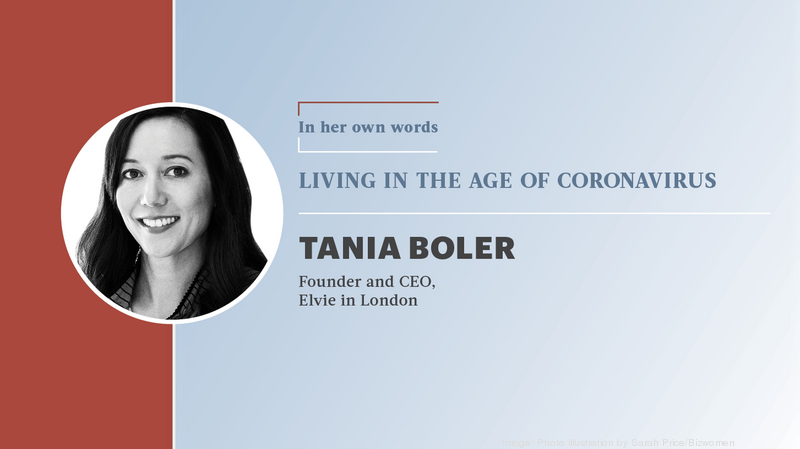In Her Own Words - Living in the Age of Coronavirus
Originally published in The Business Journals. Photo provided by Tania Boler
As our communities reopen, women across America see their lives becoming more complicated as they juggle responsibilities at home and at work (which is often still at home), caring for coworkers, customers and family. Passionate about improving the health and well-being of women, Tania Boler realized that female health products lacked technological innovation and most of what was on the market was ineffective. After having her son in 2011, Tania realized that there was an enormous gap in health education for women. Through Elvie, she’s made it her mission to lead candid conversations and develop world-class products that are powered by smart technology to address intimate health issues women face on a daily basis.
"Before Elvie, I worked in the UN and with various charities across Africa and Asia on issues from sexuality to HIV prevention. But it wasn’t until I became pregnant myself that I realized there were so many women's health issues that are often just swept under the rug and completely neglected by technological advancements. I never planned to start a tech company, but I realized there was a massive need for innovative and empathic technology to support women, and so I founded Elvie.
In 2013, I partnered with Jawbone cofounder Alexander Asseily to create a technologically innovative and highly effective device that would address common pelvic floor issues. In just a few short years, we built a team of world-class engineers, designers and business minds.
Prior to Covid-19, my mornings were spent getting the kids ready for school before heading to our HQ in London. Even before the pandemic, we built Elvie’s culture around having accommodating schedules and flexible work arrangements so employees can be with their children — something I really value as a parent. It is important to me that everyone on our team feels trusted, empowered and respected, which means allowing them the ability to set a schedule that works for their unique circumstances. This alleviates the stress with balancing work and child-care duties for parents, which also helps team members work effectively across various time zones as we have offices in New York and Shanghai. Many of the tools we rely on during Covid-19 — video calls, Slack, etc. — were already in place.
While there are many setups in place to help minimize the communication impact from Covid-19, things undoubtedly changed when there was no office to go to, kids are home without school, and lifestyles now revolve around social distancing.
We’ve also taken more steps to ensure Elvie employees have the resources they need to prioritize their health, despite uncertainties of business impact from COVID-19, so I have made it a priority to address questions and concerns openly during bi-monthly office-wide calls. From making sure remote work set-ups are healthy environments, to offering resources like classes and audio books for employee’s children, and yoga classes to our team, our People function has facilitated the distribution of resources to keep wellness of our employees top of mind.
As a business, Elvie has pivoted to adjust well with changes and have come out strong with learnings and successes in digital and social marketing efforts such as a social media campaign, #AtHomeWithElvie, that offers a series of content to educate our audience and keep them entertained, ranging from postpartum fitness classes to cooking. We have also launched our first ever TikTok campaign #MakeMommyMoves, a fun and empowering initiative, as we saw increased activity with moms on that platform. We are partnering with professionals like gynecologists, pelvic floor therapists, and doulas to support mothers and moms-to-be. Our platforms serve as our voice to promote education and diversity, while supporting mothers throughout the pandemic.
During these times, it is more important than ever to remember that no woman is an island! It’s all about shared experiences — women need to feel comfortable having candid conversations with each other to realize that what they’re experiencing is usually completely normal and that they are not alone. Our hope is to foster these honest and open conversations about our experiences so we can all be more informed."

